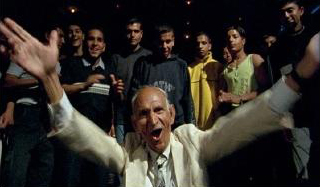|
The Shutka Book of RecordsDirected by Aleksandar Manic, 2005 By Alyce Wilson The Shutka Book of Records is a Czech film directed by Aleksandar Manic about a small village on the edge of the Balkans populated by the Romany people, or Gypsies. Rather than approaching the film, which was a documentary, from an outsider's perspective, the film instead tells the story through the eyes of several town characters. Each of them claims bragging rights as the champion of some field, ranging from training fighter geese to collecting Turkish pop music. Among them, an elderly man proud of his suit collection, whose much younger wife has just born them a child. While he begins the movie by bragging about their eternal love, it becomes clear throughout the film that there is tension between them, in part due to his demanding nature. More than one man in the village claims to have the widest suit collection, but oddly enough, they store them in piles in empty rooms, paying little attention to their care. Collectors flourish in the community. Among them, a group of old men who revel in their music cassette collections. They hold tournaments where they play their treasures for judges, who reward the top collectors. And then there are the musicians themselves, vocalists and music producers who work with seemingly antique equipment and yet whose local fame eclipses that of even international celebrities. Few women are interviewed in the documentary, probably because of societal norms that frown upon such openness from women. But one outspoken woman welcomes an interview, to boast of her abilities as a spiritualist. In a community where being unique is prized, a couple of flamboyantly gay men have carved a niche as planners for large community events. Like the old men sitting on piles of suits, they proudly point to their closets full of sequined, bright garments. While some of the town's denizens may very well be exaggerating their accomplishments, it only adds to the playful portrait of a community, demonstrating how, even in extreme poverty, culture and interconnection makes their lives rich and fulfilling.
|
